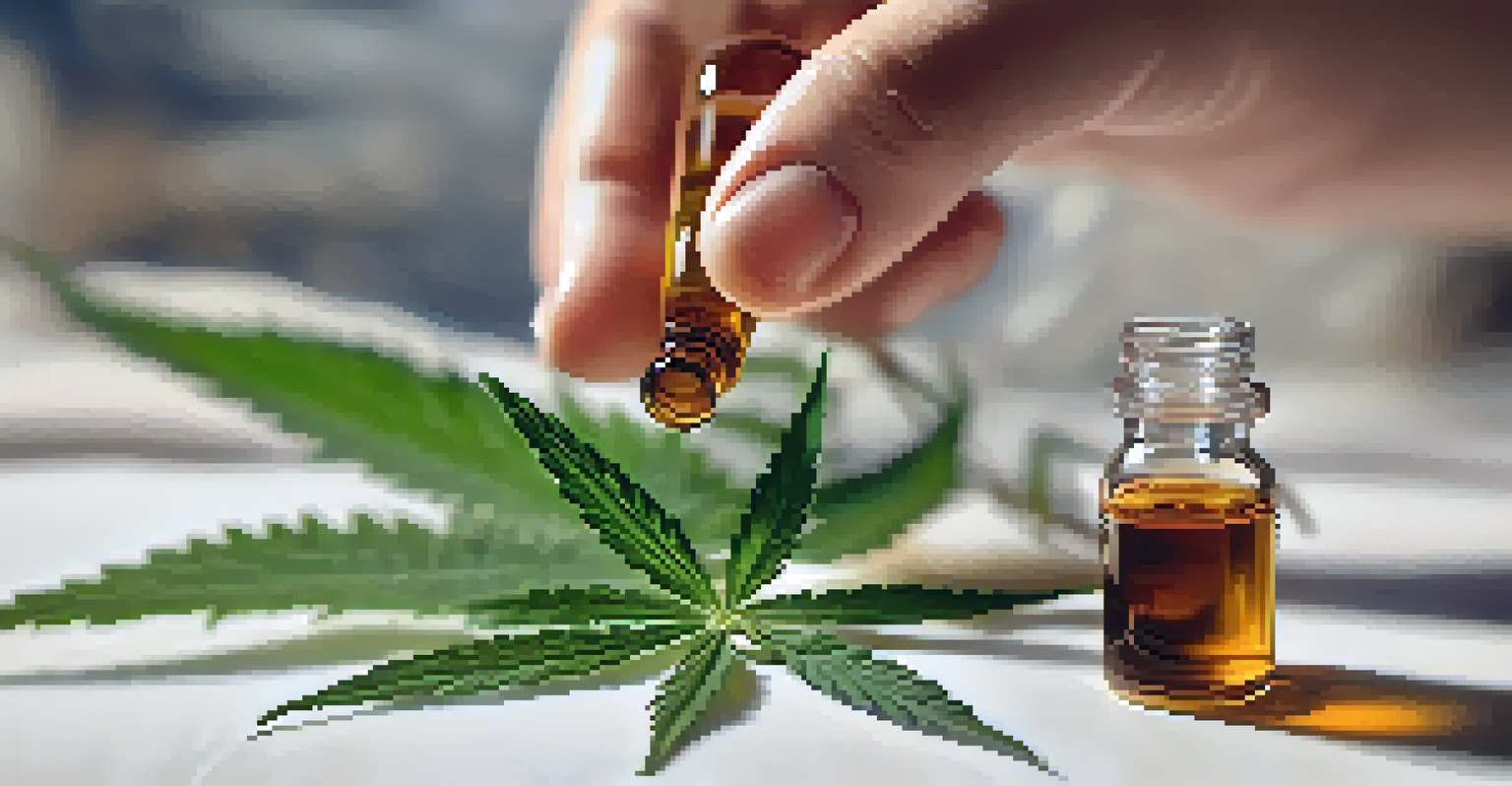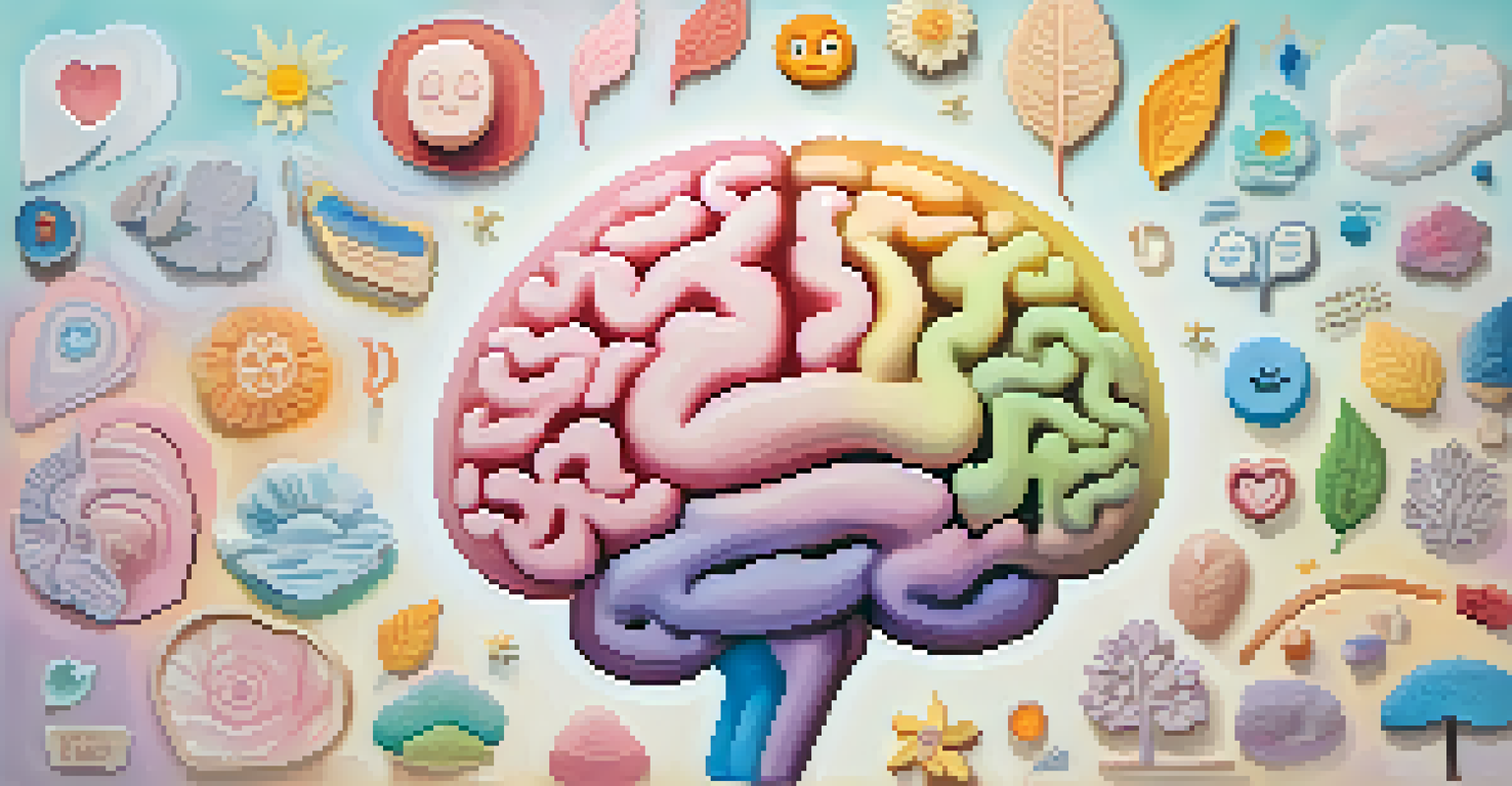Can Medical Marijuana Be an Effective Treatment for Depression?

Understanding Depression and Its Impact
Depression is more than just feeling sad; it's a complex mental health condition that affects millions worldwide. It can lead to a range of emotional and physical problems, making everyday tasks feel overwhelming. Understanding the nuances of depression is essential, as it can manifest differently in each individual.
Depression is like a war; you either win or you die.
Symptoms may include persistent sadness, loss of interest in activities, changes in appetite, and even physical pain. When left untreated, depression can significantly diminish one's quality of life, impacting relationships, work, and overall well-being. Therefore, finding effective treatments is crucial for many seeking relief.
Traditional treatments often include therapy and medications like antidepressants. However, not everyone responds to these methods, leading many to explore alternative options, including medical marijuana. This exploration has raised questions about its potential effectiveness in alleviating depression symptoms.
What Is Medical Marijuana?
Medical marijuana refers to the use of cannabis plants or cannabinoids to treat health conditions. Cannabinoids are chemical compounds found in cannabis, with THC and CBD being the most well-known. While THC is responsible for the 'high' associated with marijuana, CBD is non-psychoactive and is often touted for its therapeutic benefits.

In recent years, various states and countries have legalized medical marijuana for specific conditions, including chronic pain, epilepsy, and anxiety disorders. This shift has prompted further research into its potential role in treating depression. Understanding the differences between THC and CBD is crucial for those considering this treatment option.
Understanding Depression's Complexity
Depression is a multifaceted mental health issue that can significantly impact daily life and requires a thorough understanding for effective treatment.
Medical marijuana can be consumed in various forms, such as oils, edibles, and vaporizers. This versatility allows individuals to find a method that suits their lifestyle and preferences, making it an appealing alternative for some who may struggle with traditional medications.
Research on Medical Marijuana and Depression
Research on the effects of medical marijuana on depression is still in its early stages, but initial findings are promising. Some studies suggest that cannabinoids, particularly CBD, may have antidepressant-like effects. This is thought to occur through the modulation of neurotransmitters in the brain, such as serotonin, which plays a vital role in mood regulation.
The greatest weapon against stress is our ability to choose one thought over another.
However, it’s important to approach these findings with caution. While some individuals report positive experiences, others may find that marijuana exacerbates their symptoms or leads to unwanted side effects. The variability in individual responses highlights the need for more comprehensive studies to determine the efficacy and safety of medical marijuana for treating depression.
As the stigma surrounding cannabis use continues to diminish, more researchers are investigating its potential as a treatment option. Understanding the nuances of these studies will be critical for those considering medical marijuana as a viable alternative for depression.
Potential Benefits of Medical Marijuana for Depression
Advocates for medical marijuana often cite its potential benefits in managing depression symptoms. Some users report feeling more relaxed, less anxious, and able to engage in activities they once enjoyed. These effects can provide a much-needed respite from the emotional pain of depression, offering a sense of relief that traditional medications may not achieve.
Furthermore, medical marijuana may also help with co-occurring conditions, such as anxiety and insomnia, which frequently accompany depression. By addressing these interconnected issues, patients may experience a more holistic improvement in their mental health.
Medical Marijuana's Potential Benefits
Advocates suggest that medical marijuana may help alleviate depression symptoms and address co-occurring issues like anxiety and insomnia.
Additionally, the natural origin of medical marijuana appeals to those wary of pharmaceutical drugs and their side effects. However, it’s essential to approach medical marijuana with an informed perspective, considering both its potential benefits and risks.
Risks and Considerations of Medical Marijuana Use
While there may be potential benefits, it's crucial to consider the risks associated with medical marijuana use. For some individuals, especially those predisposed to mental health issues, cannabis can trigger or worsen feelings of anxiety or paranoia. Understanding one's personal mental health history is vital before considering this treatment option.
Legal regulations surrounding medical marijuana also vary significantly between regions. Individuals must navigate these laws, which can affect their access to treatment. Consulting with a healthcare provider familiar with medical marijuana can help guide patients through the process and ensure they are informed about legality and safety.
Moreover, dosage and strain selection are essential factors in determining the effectiveness of medical marijuana for depression. Working closely with a healthcare professional can help tailor a treatment plan that minimizes risks while maximizing potential benefits.
How to Talk to Your Doctor About Medical Marijuana
If you’re considering medical marijuana as a treatment for depression, initiating a conversation with your healthcare provider is a vital first step. Open dialogue can help ensure that you receive personalized advice based on your unique medical history and current treatments. Your doctor can provide insights into whether medical marijuana might be a suitable option for you.
Be prepared to discuss your symptoms, previous treatments, and any concerns you may have about using cannabis. This information will help your doctor assess your situation and guide you in making informed decisions. It’s important to approach the conversation with an open mind and a willingness to explore all potential treatment options.
Risks of Medical Marijuana Use
While there may be benefits, medical marijuana also carries risks, particularly for individuals with a history of mental health issues.
Additionally, your doctor can help you understand the legalities surrounding medical marijuana in your area and may even provide referrals to specialists who can assist in obtaining a medical marijuana card if needed.
Real-Life Experiences with Medical Marijuana for Depression
Personal stories can offer valuable insights into how medical marijuana impacts individuals dealing with depression. Many people have shared their journeys of finding relief through cannabis, describing how it helped them rediscover joy in their lives. These anecdotes highlight the potential for medical marijuana to serve as a supplementary tool in managing depression.
However, it’s essential to recognize that experiences with medical marijuana can vary widely. While some individuals may find significant improvement, others report little to no change, or even negative side effects. These varying outcomes underscore the importance of personalized treatment plans and ongoing communication with healthcare providers.

Listening to real-life experiences can help frame expectations and provide a sense of community for those exploring this treatment option. It’s a reminder that while medical marijuana may not be a one-size-fits-all solution, it holds promise for some seeking alternative methods to manage their depression.